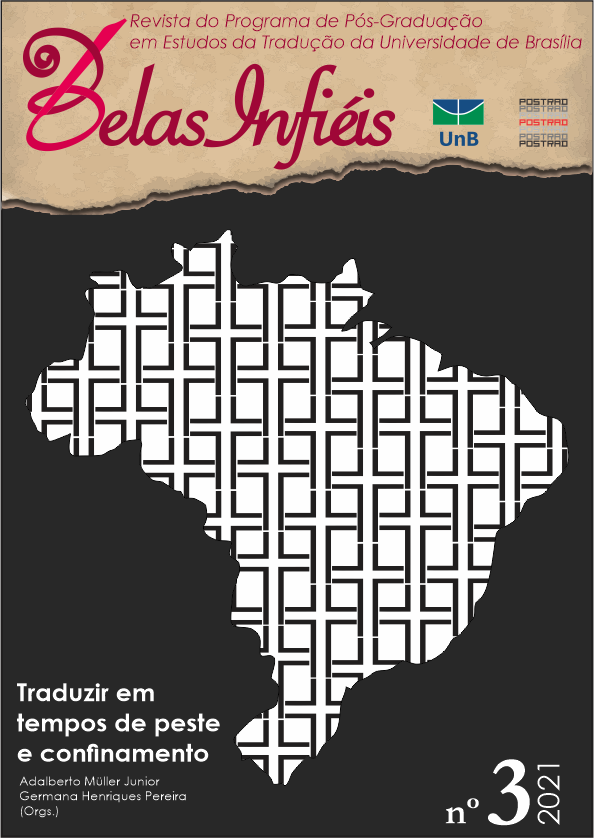Traducir en la pandemia: sobre la traducción activista y los medios de comunicación (contra)hegemónicos
DOI:
https://doi.org/10.26512/belasinfieis.v10.n3.2021.32693Palabras clave:
Traducción activista. Traducción militante. Ética en la traducción. Medios contrahegemónicos.Resumen
La pandemia por coronavirus transformó de manera súbita y global nuestra realidad, entre otras, nuestra interacción con el entorno y con las demás personas. La traducción viene desempeñando un papel clave en la transmisión de información sobre la pandemia a lo largo del mundo, especialmente, en periodos de confinamiento social. Ante el caudal tan grande de noticias, así como el número de medios y soportes que las transmiten, nos hicimos una pregunta fundamental: ¿Qué posición política (contra)hegemónica adoptan los distintos medios de comunicación en momentos de inusitada vulnerabilidad y dependencia social? Para intentar descubrirlo, hicimos un análisis comparativo de las traducciones de artículos publicados por dos medios hegemónicos argentinos y dos medios descentralizados latinoamericanos (los dos primeros y los dos segundos en una relación de antagonismo) durante la primera cuarentena estricta en Argentina (del 20/03/2020 al 10/05/2020). Los resultados sugieren que la traducción como acto manifiestamente político-social permite expandir nuevos ”“o invisibilizados”“ medios de comunicación, lo que puede hacer más posible el ideal de democratización de la información, así como señalan la importancia de la agencia de lxs traductorxs para la construcción colectiva ”“y lingüística, en principio”“ de un mundo diferente.
Descargas
Citas
Aznarez, C. (2018, 21 de julio). 30 años de “Resumen Latinoamericano”. TeleSURtv.net. https://www.telesurtv.net/bloggers/resumen-latinoamericano-aniversario-treinta-20180721-0003.html.
Baker, M. (2010). Translation and Activism: Emerging Patterns of Narrative Community. In Tymoczko, M. (Ed.), Translation, Resistance, Activism (pp. 23-41). University of Massachusetts Press.
Barbero, J. M. (1991). Modernidad y massmediación en América Latina. In J. M Barbero. De los medios a las mediaciones, de Jesús Martín Barbero 30 años después (pp. 163-259). Ediciones G. Gili. Baker. (Trabajo original publicado en 1987)
Boérie, J., & Delgado Luchner, C. (2020). Ethical issues in activist translation and interpreting. In K. Koskinen, & N. K. Pokorn (Eds.), The Routledge Handbook on Translation and Ethics (pp. 1-31). Universidad de Ginebra.
Campos, J. (2019). Contrainformación, rabia y consciencia: la red Contra Info y sus traductorxs anarquistas. Revista Lenguas V;vas., (19)15, 128-139.
Castro Vázquez, O. (2008). Género y traducción: elementos discursivos para una reescritura feminista. Lectora, 14, 285-301.
Colón Rodríguez, R. E. (2015). La traducción colaborativa activista contemporánea en Canadá y Brasil: comunidades de traducción 1.0 y 2.0 en evolución. Tradução em Revista, 18, 159-190.
Friera, S. (2010, 17 de mayo). Una voz para comunicar con conciencia. Página 12. https://www.pagina12.com.ar/diario/suplementos/espectaculos/17-17978-2010-05-17.html.
Gambier, Y. (2018). Redes de traductorxs/intérpretes benéficxs [J. Campos, Traductora. “Residencia de traducción” del Traductorado en Francés, I.E.S. en Lenguas Vivas. Traducción de: “Réseaux de traducteurs/interprètes bénévoles”. Meta, (52)4, 658-672. https://www.erudit.org/en/journals/meta/2007-v52-n4-meta1954/017691ar/]. (Trabajo original publicado en 2007).
Giraldo Díaz, R. (2006). Poder y resistencia en Michel Foucault. Tabula Rasa, 4, 103-122.
Tymoczko, M. (2010). Translation, Resistance, Activism: An Overview. In M. Tymoczko (Ed.), Translation, Resistance, Activism (pp. 1-22). University of Massachusetts Press.
Williams, R. (2000). La hegemonía. In R. Williams. Marxismo y Literatura (pp. 129-136). Ediciones Península. [P. di Masso, Traductor. Traducción de: Marxism and Literature. Oxford University Press]. (Trabajo original publicado en 1977).
Descargas
Publicado
Cómo citar
Número
Sección
Licencia
Derechos de autor 2021 CC BY

Esta obra está bajo una licencia internacional Creative Commons Atribución 4.0.
Copyright Statement
Given the public access to this journal, the texts are free to use but requires the recognition of the original authorship and initial publication in this journal to be properly stated.
The journal allows the use of works published for non-commercial purposes, including the right to submit the work to publicly accessible databases. Published contributions are the sole and exclusive responsibility of the author(s).
- When submitting papers to be evaluated by the Belas Infiéis journal, the author(s):
- Declare that the contents of the contributions are original and of their original creation, being entirely responsible for their content if there is an objection by third parties.
- Claim to be aware that they should not commit academic plagiarism.
- Declare that the manuscript has not been published, completely or partially, in Portuguese or another language. If it is a translation it should be submitted to the Translated Articles section.
- Declare that the manuscript is not being evaluated by other journals.
- Declare that the manuscript was not submitted to another journal simultaneously.
- Commit(s) to inform the journal of any kind of error or inaccuracy in their contribution (published, in evaluation or in editing) and to collaborate with the editors to make due corrections of the article (when in evaluation or editing) or erratum/retraction (after publication).
- Declare that there is no conflict of interest regarding the published work.
- Authorize its release if it is accepted for publication without any kind of monetary compensation.
- Agree to assign non-exclusive rights to publication to the magazine, remaining free to make their contribution available in other media as long as the publication of the first version in Belas Infiéis magazine is mentioned. They also authorize Belas Infiéis to assign their texts for reproduction in content indexers, virtual libraries and similar platforms.
- Maintain copyright and grant the journal the right of first publication, the work being licensed under theCreative Commons Attribution License.
- Is/Are allowed and encouraged to publish and distribute their work online after the editorial process, which may increase the impact and citation of the published work.
- Authorize the editorial team to make textual adjustments and to adapt the article to the publication rules, when necessary.



















